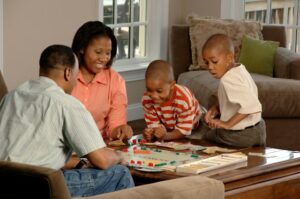Perhaps you’re concerned about your child’s mental health. Maybe they haven’t been officially diagnosed with depression, but you recognize some tell-tale signs. Now, you’re wondering what you can do to help them. Right now, you may feel helpless. You don’t want your child to feel this way, but you’re also unsure of what you can do to best support them.
You’re not a therapist, nor do you have to function as one in order to help your child if they’re dealing with depression. There are plenty things of you can do to support your child in strengthening their sense of resilience. Here’s how to encourage your child to deepen their resilience and overcome depression.
Be a Good Listener
First, it’s important to truly listen to your child when they open up about what’s wrong. This doesn’t just mean sitting with them and hearing what they’re saying. It means not dismissing or minimizing their feelings just because they’re young.
Some of the problems and worries they bring up might seem silly to an adult, but to your child, these problems loom large. Invalidating their feelings will only harm your relationship and cause them to clam up in the future when you ask, “What’s wrong?” Be ready to listen when they need you, and truly pay attention to what they say.
Keep Up with Healthy Routines
Adults with depression often have difficulty keeping up with routines. This is also true for children with depression. They might dread getting out of bed in the morning, experience a lack of appetite, or lack any motivation to play a sport or engage in any hobbies.
As a parent, it’s important to go the extra mile to help your child stick with their usual routines. A lack of healthy habits can exacerbate depression and make their symptoms worse in the long run.
 Help Them Find an Outlet
Help Them Find an Outlet
Your child can definitely benefit from opening up to you to express their feelings. But it’s also good for them to have a personal outlet for their emotions. This might be a creative hobby, like writing stories, taking dance classes, or painting or drawing.
Although depression can cause a lack of energy, some children still benefit from physical outlets like sports.
Pleasant Distractions
The notion of “distracting” your child from depression might seem shallow at first. It’s true that depression cannot be healed through distraction. But dwelling on the symptoms all of the time is not the best way to cope with this condition, either.
Instead, it’s okay to distract your child with simple joys. Going to a bakery together, spending time in nature, stopping by a local bookstore, watching their favorite movie with popcorn and snacks, and other fun bonding activities can all serve as fun, healthy distractions. These moments can remind your child that happiness is often found in small, day-to-day joys.
Connecting with a Therapist
Finally, it’s important to remember that you do not have to try to “solve” all of your child’s problems by yourself. A therapist can teach your child valuable coping skills to help them navigate tough situations.
Children may be hesitant about therapy at first, but counselors often use age-appropriate methods like play therapy and art therapy, which can be quite fun and engaging for kids! In therapy, your child will find another listening ear. By working with a child therapist, you can expand your child’s support system so they have a stable foundation.
—
Do you suspect that your child is struggling with depression? A therapist can help them heal. Reach out to us to find out more about our child therapy services.
